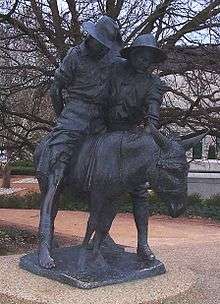Mateship

Mateship is an Australian cultural idiom that embodies equality, loyalty and friendship. There are two types of mateship, the inclusive and the exclusive; the inclusive is in relation to a shared situation (e.g., employment, sports, or hardship), whereas the exclusive type is toward a third party (e.g., a person whom you have just met). Russel Ward, in The Australian Legend (1958), saw the concept as a central one to the Australian people. Mateship derives from mate, meaning friend, commonly used in Australia as an amicable form of address. Mateship can also be expressed in such qualities as loyalty to one's mates in preference to society at large.
Military context
Mateship is regarded as an Australian military virtue. For instance, the Australian Army Recruit Training Centre lists the "soldierly qualities" it seeks to instill as including "a will to win, dedication to duty, honour, compassion and honesty, mateship and teamwork, loyalty, and physical and moral courage."[1]
Australian Constitutional preamble
During the 1999 Australian constitutional referendum there was some consideration regarding the inclusion of the term "mateship" in the preamble of the Australian constitution. This proposed change was drafted by the Australian poet Les Murray, in consultation with the Prime Minister of the time, John Howard:
Australians are free to be proud of their country and heritage, free to realise themselves as individuals, and free to pursue their hopes and ideals. We value excellence as well as fairness, independence as dearly as mateship.
Murray was not supportive of the inclusion of "mateship" in the preamble, stating that it was "blokeish" and "not a real word", but the Prime Minister insisted it be included as the term, he said, had "a hallowed place in the Australian lexicon".[2] Howard reluctantly dropped the term from the preamble, after the Australian Democrats refused to allow it to be passed by the Senate where they held the balance of power.[3]
Since the referendum the Australian government has introduced the concept of mateship as a possible part of an Australian citizenship test, although it was unclear how endorsement of the values of mateship would be tested.[4]
See also
References
- ↑ "The Aim of Recruit Training". Army Recruit Training Centre. Archived from the original on 2007-08-31. Retrieved 2007-10-02.
- ↑ Kitson, Jill: Mateship..., Lingua Franca (Radio National), 24 April 1999.
- ↑ Mateship: Hit for six, British Broadcasting Corporation, August 12, 1999.
- ↑ Migrants need to learn mateship: PM, The Sydney Morning Herald, December 12, 2006.
Further reading
- Dyrenfurth, Nick (2015), Mateship: A Very Australian History, Scribe Publications, Melbourne
- Page, James S. (2002) 'Is Mateship a Virtue?' Australian Journal of Social Issues. 37(2): 193-200; available on-line at http://eprints.qut.edu.au/archive/00003567/
- Russel Ward, (1958), The Australian Legend, Oxford University Press, Melbourne